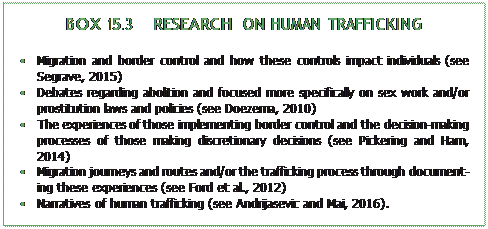 |
Research on human trafficking. Research design. Researching by talking: interview-based research
|
|
|
|
RESEARCH ON HUMAN TRAFFICKING
 Human trafficking research is a very broad field with a diverse range of research designs and research approaches. In many ways, this also reflects the diverse
Human trafficking research is a very broad field with a diverse range of research designs and research approaches. In many ways, this also reflects the diverse
disciplinary backgrounds of researchers contributing to the knowledge base. Here, we focus on two broad areas of research: qualitative research via in-depth interview- ing and documentary analysis. For the first part, we focus less on the process of doing interviews and instead seek to highlight the complexities and challenges of undertak- ing qualitative research in this field. In the second part, we draw attention to some key examples of diverse documentary (by which we mean a variety of texts) analyses in the field, and offer some explanation of the types of research tools being applied. We focus on this because, as indicated above, research on human trafficking is more than just about the ‘crime’ itself and includes, but is not limited to:
· decision making by immigration and criminal justice authorities
· supply chains and issues of responsibilities of corporations to labourers at the resource harvesting and assembly end all the way through to consumers
· the production of data, testing empirical methods for identifying prevalence
· the production of narratives of human trafficking via fictional media (film, books, etc. )
· the examination of reports on ‘success’ in counter-trafficking strategies
· the interrogation of criminal justice and prosecution data to better understand the attrition of cases from identification to prosecution and to examine which cases are being prosecuted and why.
For undergraduate and postgraduate students, there are significant challenges to undertaking research in this area. Access is difficult due to reaching participants (which requires time to build relationships and rapport with key people and agen- cies). Ethics approval to undertake research in this area can be difficult, depending on your focus and your intended participant group (for example, victims are per- ceived to be a vulnerable population often requiring more rigorous ethical safety nets to be put in place, and working with police can require additional ethics approval from within their agency). There are also, often, issues of timeliness, as it is difficult to overcome these research hurdles and still have time to undertake research and produce a high-quality analysis.
An alternative approach might be that you think more broadly about how we understand and respond to human trafficking at the local, national, regional and international levels, and the consequences of this. This too requires careful, rigorous qualitative research that examines, for example, policy, news media and/or art (in forms including cinema, written fiction, visual art), but due to the accessibility of the primary data it may be more practicable for the novice and early career researcher.
Research design
|
|
|
Two points regarding research design. First, we bear in mind one goal of research: to examine policy and practice with independence and rigour. The process should be
transparent and replicable. Second, regardless of the type of research being under- taken, it is essential to identify the research focus. Previous research on human trafficking has explored a range of issues, adopting various approaches, as detailed in Box 15. 3.
 |
Researching by talking: interview-based research
There are a range of approaches to doing interview-based research. We focus here on semi-structured interviews. This form of interview enables the researcher to have a consistent set of themes or questions that guide each interview and allow for consist- ency across the interviews, so that key issues are addressed to some extent in every interview. However, this style of interview allows the researcher and the participant to also follow the flow of conversation, to explore in detail issues or ideas that arise in the course of the interview that may diverge from the research focus. Effectively, this style of interview allows the original research questions to be addressed whilst also enabling unanticipated ideas and issues to arise. As other chapters in this book deal more specifically with interviews, we focus on issues that arise in preparing for fieldwork, and pursuing participants who are victims/survivors of human trafficking. For our research, which spans multiple projects that inform this chapter, our broad aims and objectives have generally been around the implementation and impact of counter-trafficking policies and border and labour enforcement practices. Across these projects, our aim is to document implementation practices (this includes the attitudes and understanding of key stakeholders, such as police implementing counter-trafficking efforts) with a focus on challenges that arise largely due to the interaction of unlawful migration status and exploitation. Our work has also sought to document the impact
of counter-trafficking efforts via talking to migrant workers who have not been recognized as victims, and those who have. We view their experience as critical both to making sense of the impact of the official response, and offering a more complex understanding of how exploitation is experienced and managed by indi- viduals. Given these objectives, interview and documentary research is well suited to achieving this.
|
|
|


